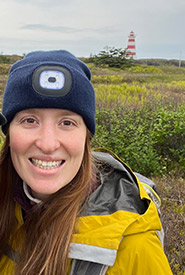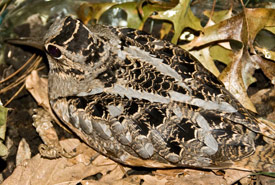NCC: Land Lines – Understanding gratitude as a survival skill
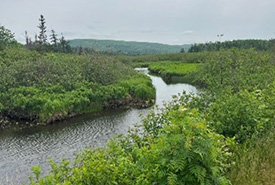
NCC’s Black River Bog property, NS. (Photo by Jill Ramsay/NCC staff)
A naturalist and former mentor of mine once told me that gratitude was a survival skill. My initial interpretation took this to be a re-imagining of the various “stay positive” expressions we have all heard over the years. But he explained further, connecting this concept to the origins of human nature. He claimed that the common depiction of the early trade economy was wrong.
“Before resources were abundant or easily attained, people had to rely on stimulating gratitude in one another to ensure their survival,” he said. “It would be improbable that the early trade economy would have looked like trading one hide or pelt for a bag of grains in an instantaneous exchange. In hard times of survival, there was no storing or saving of resources. People who were successful in obtaining a resource would be likely to share with the hopes that this gratitude would generate reciprocity down the line.”
In this way, the expression of gratitude would promote mutual longevity, and truly can be understood as a survival skill.
This early form of the trade economy has become far less commonplace in western culture, and the threats facing our survival have also drastically changed. However, the opportunity to use gratitude as a survival skill can still be applied to our modern circumstances.
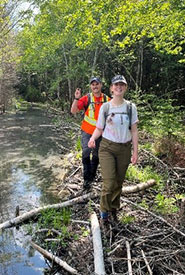
Nova Scotia interns Matt Nettle (left) and Jill Ramsay (right) crossing a beaver dam on a property near Yarmouth, NS. (Photo by Sam Ceci/NCC Staff)
As the Nova Scotian stewardship intern with the Nature Conservancy of Canada (NCC), many of my roles and responsibilities allow to me to spend time working in the field. From Yarmouth to Cape Breton, I have had the opportunity to work with the stewardship team, assisting in the monitoring of countless properties protected by NCC.
I have hiked through Wabanaki (Acadian) forests and gingerly crossed over active beaver dams and eroding gypsum slopes. I have seen the presence of accidental transient birds (birds that have flown off course during their migration) and learned to recognize the distinct songs of countless regulars of the woods. I have worked with locals to bring awareness to the protection of sensitive areas and shared in the joy of community that is fostered through taking action to conserve natural spaces. This, of course, is a cherry-picked overview of my work this summer, and while I hold such gratitude for these adventures, they do not speak for the entirety of the field work experience.
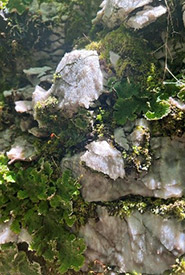
An up-close photo of a gypsum rock wall found on the Cains Mountain property in Cape Breton, NS. (Photo by Jill Ramsay/NCC staff)
The truth is that field work can be challenging. The side less often shared includes poisonous plants and biting insects at every step as you force your way through swampy thickets in 30 C humidity. Saturated socks rub your blisters raw as you crawl over and under impossibly dense forest, uphill, with no sign of a clearing in sight. It can be the emotional toll of walking through long-abandoned clearcuts, forever shaped and impacted by humans, or recognizing that a previously mapped-out patch of invasive plants has only continued to grow more bold and is pushing out valuable natives. There are moments in the field that are physically and mentally tough to endure.
These hard moments always lead me to think back to gratitude as a survival skill. Anytime we put aside our own comfort for the betterment of the natural world, we are entering into a form of trade economy with the Earth. We can give our perseverance, energy and resilience to conservation efforts, knowing that in return we will be rewarded with the beautiful, magical experiences and teachings the land continues to offer. It is a trade I would never hesitate to enter, time and time again.
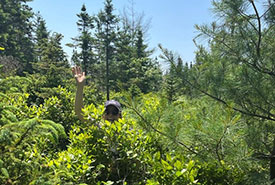
Jill Ramsay bushwhacking in the field at one of NCC’s Port Joli properties in Nova Scotia. (Photo by NCC)
The conservation work that NCC staff and volunteers do is making a difference. Our collective efforts result in helping to maintain the natural world so that we, along with our fellow creatures, can continue to enjoy all that nature has to offer. I hold deep gratitude to be a part of this mission through my internship, even through the tough times.


